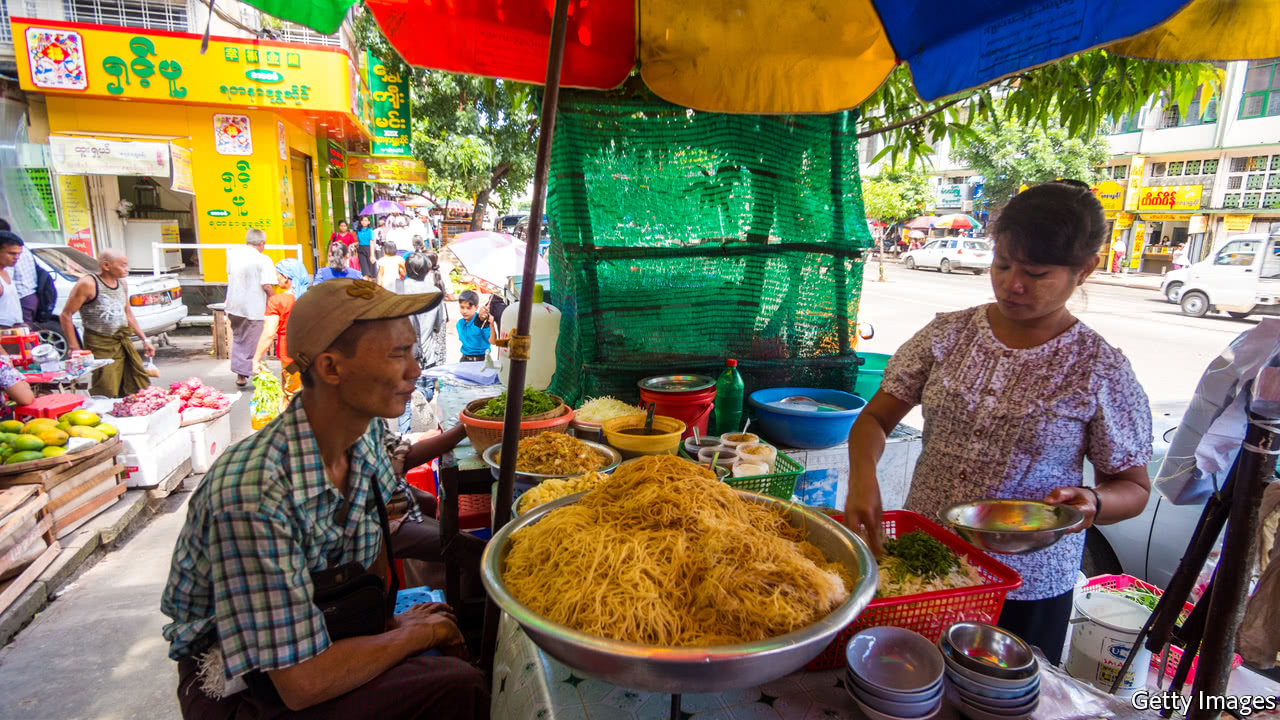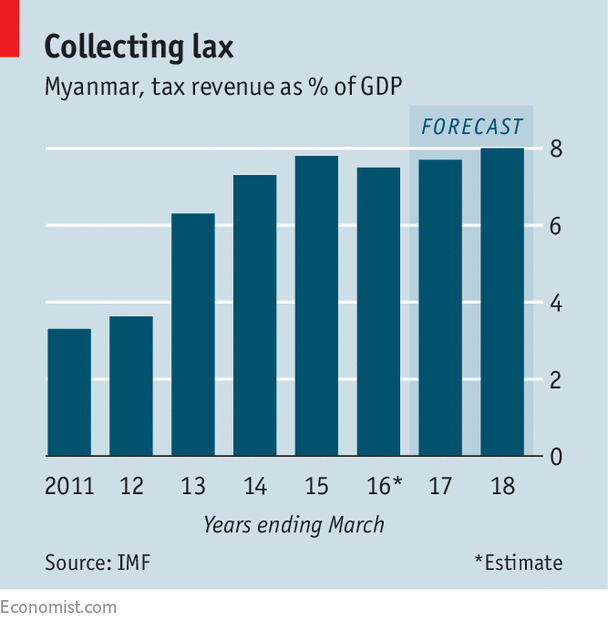That makes it hard for the new, democratic government to offer decent public services.
| YANGON

INSIDE a noodle house in central Yangon, business is
buzzing. Customers huddle over tables, slurping down chicken soup or
gobbling dumplings. Everyone pays in cash. Few customers ask for
receipts. When your correspondent does so, one is handed over, complete
with government-issued stickers. But the cost of the meal goes up. On
the vast majority of the restaurant’s sales, it seems, no one is paying
any tax.
Over the past decade the Burmese economy has
boomed. Last year it grew by 5.9%. In the medium term growth is expected
to average 7.1% a year, according to the World Bank, making the country
one of the peppiest in the region. Poverty, though still stark, has
fallen.
Yet
Myanmar has the lowest tax take in South-East Asia and one of the
lowest in the world, at a meagre 7.5% of GDP. That compares with 16% in
Thailand and 14% in Cambodia. Under Myanmar’s military rulers, the
picture used to be even worse. In 2011 the government collected less
than 4% of GDP. That year, however, Thein Sein, the general who had just
become president, launched an economic reform programme that included
opening an office responsible for collecting tax from big firms. By 2015
government revenue had more than doubled (see chart). It has since
stagnated.

The
generals permitted free elections in 2015, allowing the National League
for Democracy to come to power. Among its priorities are clamping down
on corruption and broadening the tax base. Businessmen complain that
taxmen gouge them for bribes, not revenue for the state. Humbler
citizens, meanwhile, tend not to pay tax on their income.
Other
taxes are routinely dodged, too. In order to avoid paying property
taxes, some buyers and sellers, or landlords and tenants, create two
contracts: one recording the actual transaction and a dummy to be
submitted for tax purposes, says Lachlan McDonald, an economist at the
Renaissance Institute, a think-tank in Yangon. Most Burmese donate money
to Buddhist temples or other religious institutions as a matter of
course. Handing money over to the exchequer is a far less common
activity.
“People do not want to pay tax because they
have never had much from the government,” says Matthew Arnold of the
Asia Foundation, an American NGO. Under the military regime, generals
made money from jade, narcotics and construction; Burmese without
connections made so little money there was little point asking them for
any. As a result, municipal services, which are meant to be paid for
through local taxes, were and are scant. In Yangon the official
municipal charge for rubbish collection is a token 600 kyats ($0.44) a
month. But a resident complains that to get the rubbish taken away, she
must pay informal street-cleaners an extra 200 kyats a bag.
It
does not help that the system for collecting taxes is hopelessly
antiquated. Assessments for property taxes are based on poor proxies for
value such as the number of storeys in a building and the materials
from which it is built. There is no effort to account for inflation. All
the relevant information is kept on paper, with almost no digital
records. According to Michael Lwin of Koe Koe Tech, a firm that has
launched a pilot scheme to allow local governments to offer services
online, this system puts the average annual rental value of the 23,516
recorded properties in the relatively affluent city of Taunggyi at $21,
when in practice buildings are let out for much more. Even if tax
collectors really intended to raise money for the government, it would
be hard to collect much.
The city government in Yangon,
the commercial capital, has set up an office to check up on a broader
range of potential taxpayers, beyond the big fish. But the NLD
government may be facing a Catch-22: it will be hard to persuade Burmese
to pay tax unless they receive some services in return, but it will
also be hard to offer decent services without collecting some tax.
Ref:https://www.economist.com/news/asia/21731437-makes-it-hard-new-democratic-government-offer-decent-public-services-myanmar-has


No comments:
Post a Comment